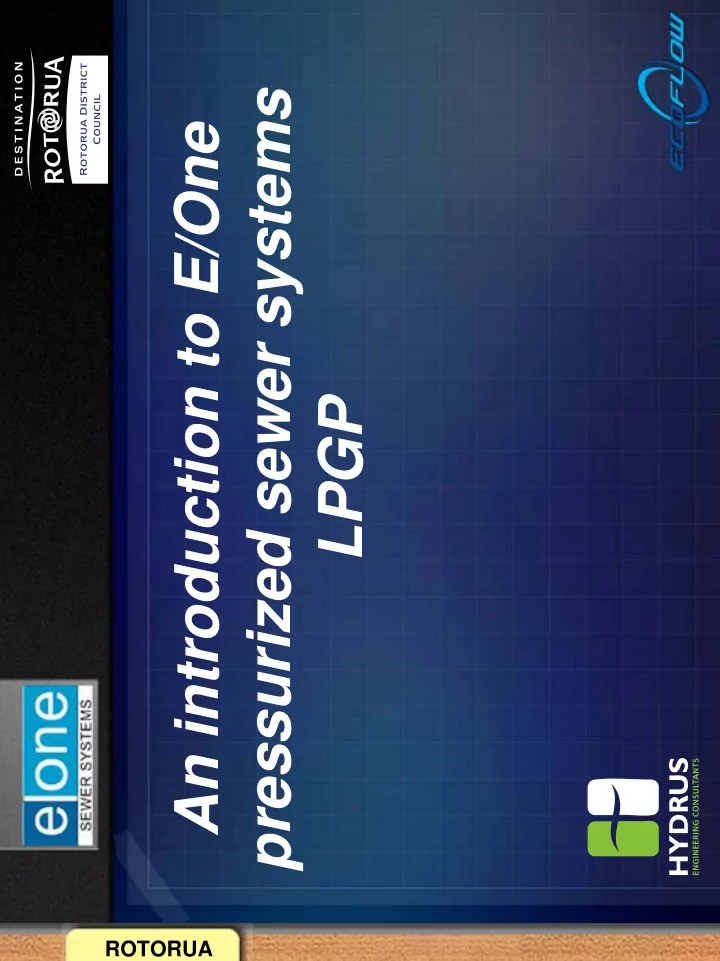

pressurized sewer systems An introduction to E/One LPGP ROTORUA
What we will cover today ROTORUA • Pressure Sewer in Rotorua • What is a Pressure Sewer System (LPGP) ? • How does it work ? • Reticulation system components • Homeowner Information
Introduction ROTORUA • Rotorua District Council has committed to the implementation of sewerage schemes to service fourteen lakeside communities within the District. • These communities are situated along four major lakes in Rotorua that are well known for trout fishing and other recreational uses. • The implementation of a sewerage scheme in these communities is one of the measures being put in place to improve water quality within these lakes.
Challenges faced by RDC with conventional gravity system ROTORUA a. The need for trench dewatering • Pumice soil type made it impossible to dig and lay the pipelines in dry trench. • Dewatering operation undertaken 24 hrs before excavation. • Dewatering undertaken continuously until the pipeline has been laid and backfilled. • Added cost to projects.
Challenges cont’ ROTORUA b. Difficult Site Access to Lakeside Properties & Reinstatement Issues • Undermined established driveways, plants and landscaping. • Created a “war zone” like setting. • Reinstatement expectations between the affected property owner and Council. • Added cost to project. Typical level of property disruption resulting from pipeline construction along lakeside properties
What is pressurised sewer? ROTORUA • Sewage reticulation network • Each property has a tank and grinder pump • Macerated slurry is pumped through small bore PE pipes • Pipes can follow the contours of the land (no deep trenching) • Capable of pumping many km’s to centralized WWTP or manhole
What is pressurized Sewer? ROTORUA
Origins of pressurized sewer ROTORUA • The pressure sewer concept proposed by Harvard Engineering, Professor Gordon M. Fair in 1965 • The ASCE commissioned Paul Farrell to implement a full- scale “Demonstration Project” in Albany NY • Applying GE’s food waste disposal and home wastewater treatment systems technology the team developed the pump unit to be used. • For 13 months they studied 12 working units and recorded the environmental, electrical and mechanical performance of the project. • A GE management buyout of the technology formed the first pressure sewer company - Environment One Corporation • EOne now has more than 350,000 units in operation in more than 10 countries
What are the advantages? ROTORUA • Not subject to stormwater or groundwater infiltration • Suitable for sites with no natural fall where gravity system would require many pumping stations • And sites with high water tables • Lower cost of reticulation - lower material, excavation, dewatering and reinstatement costs • Minimal disruption to existing infrastructure
What are the advantages? ROTORUA • Extended power blackouts less likely to lead to overflows than conventional PS, (over 24hrs storage at each home) • Lower treatment plant operational costs due to substantially lower inflow. New plants can be designed smaller • More consistent inflow to treatment plant due to buffering effect of the tanks • Staged build out advantages reducing up front capital costs
How does it work? ROTORUA • The E/One pump is a semi Progressive Cavity pump based on the Moineau principle
Reticulation System ROTORUA
Home owner info ROTORUA • What equipment do I have on my property ? • What disruptions can I expect ? • What about noise / smells • What can / can not go through the system ? • What happens if the alarm goes off ?
Pump Station Alarm Panel Equipment on site ROTORUA
Pump Station Alarm Panel Equipment on site ROTORUA
Disruptions – Street Mains Either directional drilled or shallow open cut. ROTORUA
Disruptions – Home owners Access to electrical distribution board Wiring of alarm panel & ROTORUA
Disruptions – Home owners Installation of pump station ROTORUA
Completed Installation ROTORUA
Operation & Maintenance ROTORUA • The E/one grinder pump is designed as any other home appliance, that is run to failure. • There is no requirement for annual preventative maintenance • After 37 years of experience e/one have sufficient operating data which states an average mean time between service calls of 10 years. • Actual pump life exceeds 25 years • Average maintenance cost is about $85 / pump / year • Low Energy Consumption - Pump is activated automatically. Runs for short periods. Typical annual energy consumption is approximately $25 / year.
Do’s and Don’ts ROTORUA
If the Alarm goes off ? ROTORUA
ROTORUA
Recommend
More recommend